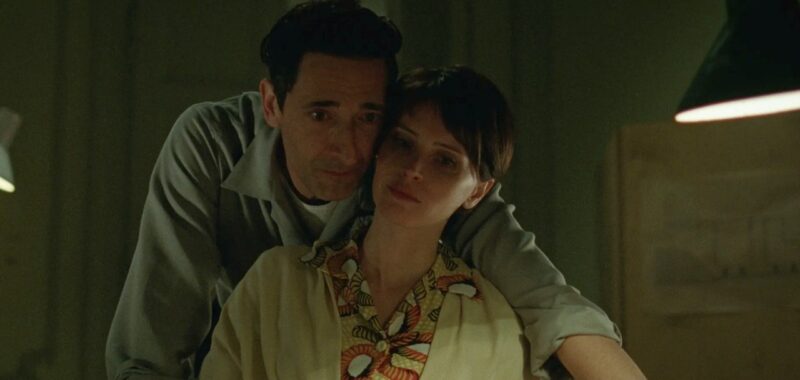Another very, very long movie has arrived, welcomed after its premiere at the Venice Film Festival by a torrent of hyperbole that could fill the Grand Canal: The Brutalist, the third feature film directed by Brady Corbet, following his Natalie Portman-starring pop-star-school-shooter psychodrama (really, watch it) Vox Lux. It is 215 minutes long. Over three and a half hours. Such is its whopping length, it screened at the festival with a 15-minute intermission, a move that may draw the ire of movie fundamentalists but comes very much approved by the British Chiropractic Association.
If the reviews are anything to go by, it’s worth the numb bum. In his five-star review, for example, The Telegraph’s Robbie Collin compares it to such canonized American epics as Once Upon a Time in America and There Will Be Blood. The Hollywood Reporter calls it a “monumental symphony of immigrant experience.” But what is The Brutalist actually about, you ask? To summarise in less than 215 characters: Holocaust survivor László Toth, a visionary Hungarian architect played by Adrien Brody, carves out a new life in a burgeoning America, where he is supported by a mysterious benefactor played by Guy Pearce. Which is to say that, thematically, it’s taking big swings—not least surveying the American Dream through the eyes of a post-war migrant—with the film concerning Toth’s 30 lived years after arriving on Ellis Island.
So the scope is ambitious with scale to match, as tends to be the case with movies whose runtimes push into and past the three-hour mark. This ain’t no 80-minute slasher about rich kids getting slaughtered at a remote mansion, or an escapist buddy comedy starring The Rock—Corbet is asking us to engage with the work, to use our brains, to think about what his images convey about the myth of America. With such solid reviews and the backing of critics calling it a modern classic, it will likely be among the frontrunners at the Oscars. But it also arrives in a moment of discourse around the perceived overlength of many movies. Just last year, the likes of Martin Scorsese’s Killers of the Flower Moon (three hours 26 minutes), Napoleon (two hours 38 minutes, with a nearly three-and-a-half hour director’s cut now streaming) and even eventual Oscar winner Oppenheimer (three hours exactly) divided opinion on their runtimes.
During the press conference for The Brutalist in Venice on Sunday, Corbet batted away the runtime debate as a tiresome nuisance. “I think it’s quite silly actually to have a conversation about runtime, because that’s like criticizing a book for being 700 pages instead of 100 pages,” he said. To him, it’s about “how much story there is to tell.”
Quite right. While the debate around long movie runtimes has got louder in the last half-decade, no doubt spurred on by the uptick in auteurist epics like Scorsese’s Killers and The Irishman, Quentin Tarantino’s languorous L.A. period piece Once Upon a Time… in Hollywood, and underrated indulgences such as Ari Aster’s Beau is Afraid, the bigger point is frequently lost: whether or not said runtime is justified. And it often has been. I for one would’ve stuck around for another hour of hanging out with Brad Pitt and Leo DiCaprio in what is increasingly considered Tarantino’s best movie this century. Both Killers and The Irishman are gripping, elegiac masterworks throughout, even if they do ask a bit more of our focus than your average blockbuster. And 180 minutes of film hardly stopped Oppenheimer from hoovering up the movie awards—and almost a billion dollars at the global box office.

